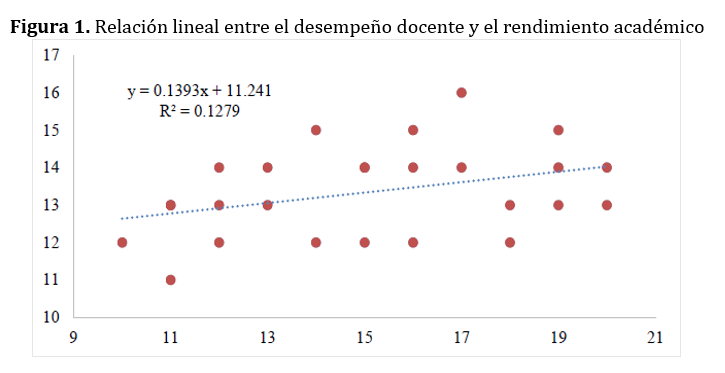Teaching performance and academic performance of university accounting students
DOI:
https://doi.org/10.51252/race.v1i2.354Keywords:
teaching, learning, articulated management, university educationAbstract
Academic performance is decisive for success in the university context, but it depends on or is associated with teaching performance in the teaching-learning process. The purpose of the research was to determine the relationship between the teaching performance and the academic performance of the students of the fifth cycle of the professional accounting school of the National University of San Martín, enrolled in the 2020-I semester. A basic non-experimental correlational cross-sectional study was chosen. The sample population consisted of 26 students, 15 men and 11 women, to whom a survey questionnaire was applied to identify the perception of teaching performance, in addition, a documentary analysis guide was used to measure academic performance; both instruments were validated and reliable. Pearson's correlation test showed a medium-high positive correlation of 0.6245 at 95% confidence between the variables of teaching performance and academic performance; that is, academic performance depends on or is associated with 62.45% of academic performance. It is concluded that accounting students present average levels of academic performance, the same that is due to the regular performance of university teachers.
Downloads
References
Castañeda Paz, M. I. (2018). Relación del desempeño docente y el rendimiento académico de los estudiantes. Revista Ciencia Multidisciplinaria CUNORI, 2(1), 41–46. https://doi.org/10.36314/cunori.v2i1.51
Cortés Pascual, A., Moyano Muñoz, N., & Quílez Robres, A. (2019). The Relationship Between Executive Functions and Academic Performance in Primary Education: Review and Meta-Analysis. Frontiers in Psychology, 10. https://doi.org/10.3389/fpsyg.2019.01582
Cruz del Castillo, C., Olivares Orozco, S., & González García, M. (2014). Metodología de la investigación (1ra ed.). Grupo Editorial Patria.
Fraile Aranda, A. (2006). El sistema universitario europeo como modelo posible para la educación superior latinoamericana. Revista Electrónica de Investigación Educativa, 8(1). https://redie.uabc.mx/redie/article/view/119
Gómez Chipana, E. (2020). Educación virtual: incidencia del desempeño docente en el rendimiento académico de los estudiantes universitarios. Ciencia Latina Revista Científica Multidisciplinar, 4(2), 1302–1317. https://doi.org/10.37811/cl_rcm.v4i2.157
Guizado Salazar, G. G., Valenzuela Rodríguez, M. A., & Vallejo Quispe, P. A. (2020). Desempeño docente y el rendimiento académico de los estudiantes de la Facultad de Tecnología en la Universidad Nacional de Educación de Perú. Revista Conrado, 16(72), 200–203. https://conrado.ucf.edu.cu/index.php/conrado/article/view/1231
Kim, K. R., & Seo, E. H. (2018). The relationship between teacher efficacy and students’ academic achievement: A meta-analysis. Social Behavior and Personality: An International Journal, 46(4), 529–540. https://doi.org/10.2224/sbp.6554
Padilla Macedo, B. T., & Villafuerte De la Cruz, A. S. (2019). Desempeño docente y rendimiento académico de los estudiantes del curso de técnicas de estudio de una universidad privada confesional. Revista Muro de La Investigación, 3(1), 13–29. https://doi.org/10.17162/rmi.v3i1.1111
Ramos Monsivais, C. L., & Roque Hernández, R. V. (2021). La influencia docente y el rendimiento académico en estudiantes de una Universidad Pública Mexicana. Dilemas Contemporáneos: Educación, Política y Valores, Esp. https://doi.org/10.46377/dilemas.v8i.2755
Villena Andrade, T. D. (2020). Desempeño docente y rendimiento académico en la Escuela Académica Profesional de Turismo, Hotelería y Gastronomía de la Universidad de Huánuco, período lectivo 2014 – I. Social Innova Sciences, 1(3), 27–36. https://socialinnovasciences.org/ojs/index.php/sis/article/view/27

Published
How to Cite
Issue
Section
License
Copyright (c) 2022 Carmen Pérez-Tello, Raidith Riva-Ruiz, Jorge Tuesta-Pinedo, Julio González-del-Águila

This work is licensed under a Creative Commons Attribution 4.0 International License.





